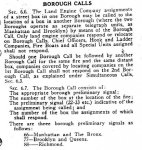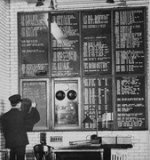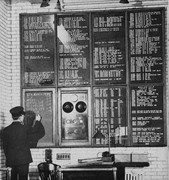******* said:
Interesting what so many of you have written. Thinking back, when I was coming on the job the "Rock" aka Welfare Island training academy was also where companies were special called to for rating. It was a penal institution under the then FC Cavanaugh. It even made the papers how fire companies and/or individual ff's were sent back to the Rock for retraining if they failed evolutions or written tests. The way a company was called was via the bells at 0900 each weekday 9x6 tour, signal 99-920 was the Rock response if I remember right. At 0900 things would stop and then 99-920- (engine or truck number would come in over the bells. You never knew if/when your company was to be called (later years it would be on the D.O. what battalions were up). If your company was called all hands would immediately get on the rig, wash it check the tools prior to responding. Two stories I have written before about the Rock. When I came on 3/30/60 a probationary ff reported to a division. You worked straight day tours in companies in the division prior to going to training school. Crazy buts that's how it was. My second day on the job myself and another proby were assigned to 19 truck. At 0900 19 was called to the Rock. We responded and on arrival a Lt. was waiting for 19. He started to give out assignments for a bldg. fire into one of the training buildings. He told me and the other proby to put the scaling ladder to a 2nd floor window. We had to be told by another ff what a scaling ladder was. He pointed to it and we took it off the rig. We started to raise it, lost it and dropped it on the helmet of another ff. The Lt ran over to us and said "how long are you ass holes on the job that you can't handle a scaling ladder". I said "what time is it'? He said "what the hell difference does that make"? I said well we came on at 0900 yesterday so I guess its around 25 hours. He had us sit under a out of the way tree for the rest of the evolution. 15 years later I'm now Captain of 82 engine and back at the rock with my guys for evaluation. I was somewhat concerned as we never drilled, never had time for them, and as a company was rated "by the book" I figured there may be a pass/fail problem. But I was wrong and we passed 4 out of the 5 evolutions tested on. We finished up on a road off the East River. I lined my guys up and told them how proud I was of them, great job. With that a Circle Line boat is passing. I know that when the boat passes the rock the tourists are told that "on your right is the training academy for the FDNY." It was summer and many tourists were waving to the guys. I look over at them and one of my brain surgeons is on the sea wall railing mooning the tourists. Thought I would "hear" about it, but didn't. Memories.
Chief, "I loved the story". You got what it takes. Those were the kinds of stories that I remember many of the GREATEST FIREFIGHTERS ever in the history of the universe to tell or take part in. I owe you a couple of beers for that one.
Honestly Chief, all kidding aside, you really do represent the Greatest Generation of Firefighters. And quite honestly, NO ASS KISSING about it. I am fortunate enough to know a handful of others who were also a part of your generation on the job then. They are GREAT GUYS. I always wanted to sit down with one or two of them, I buy the beers and they just talk. A few weeks ago, I did get to sit down with one of them. We did talk, for about four hours. In fact a little over that because when I came out there was a parking ticket on my car for overtime parking (4 hours). But instead of me buying, "he bought the drinks, AND chow for ME".
I actually told him that although I was a career firefighter for about 30 years, "I could NOT relate to what he did for a job as a firefighter". It's the truth. I also personally know a few others that I feel the same about. As I see it, "you guys were the BEST". I don't think we will ever see a time again, ever in this country, where firefighters throw themselves in danger for others, so many times, as these firefighters did.
Speaking as a buff now, I was just lucky enough to be there and see it for myself. Through this thread on this site, I hope that the time frame and events are never forgotten because unfortunately, on another thread we are seeing that many are being called back to their Creator.
Let me end by saying that you are the BEST. The Greatest Generation of Firefighters proved that to me over those 15 or 20 years. And I think that much of what you did then, has been taught and learned by the firefighters of today, who like you, continue to risk their lives every day for citizens they don't even know.




